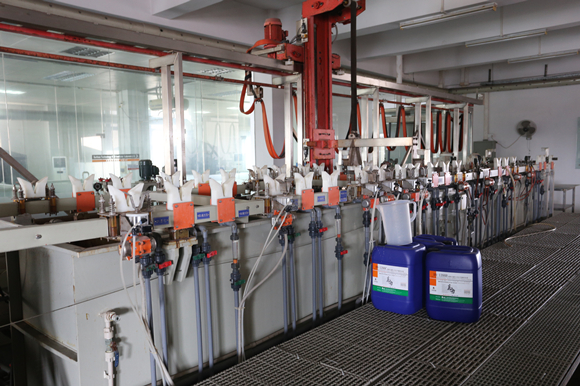General Failure Analysis and Treatment for Plastic Plating Process
With characteristics of light weight, easy molding and beautiful appearance of metal coating, plastic electroplating products are widely used in the production of automobiles, motorcycles, household appliances parts and plumbing equipments. In some certain extent, plastic electroplating technology can not only take the place of valuable non-ferrous metals, but also save the time, simplify the process, improve the appearance of parts, raise labor productivity, reduce product weight and cut down the product cost.
However, in the process of plastic electroplating, a variety of electroplating problems will be met, and some common problems analysis and processing methods of plastic plating process are summarized as follows:
|
Failure
|
Analysis
|
|
Has bubbles, wrinkles, uneven seams on the plastic
part surface
|
1. Plastic injection mold is not smooth
2. Improper plastic injection conditions
3. High water content in plastic
|
|
The surface of part isn’t hydrophilic after roughening
|
1. Roughen is not enough
2. The plastic is improper
|
|
After roughening, the surface of the plastic part will be crumbly or appear yellow, and it is easy to be scratched.
|
1. Too much roughen, break the surface of plastic
2. Bad quality plastic
|
|
No nickel deposit or just partly deposit during the
electroless nickel process
|
1. Imbalance electroless nickel solution
2. Colloidal Pd isn’t activated enough, colloidal dissolve not enough or too over
3. Parts have inner stress
|
|
No copper deposit or just partly deposit during the
electroless copper process
|
1. Imbalance electroless copper solution
2. Not enough roughen
3. Failure colloidal Pd activation solution
4. Colloidal dissolve too over
5. Parts have inner stress
|
|
Have powder on the surface of electroless nickel
solution or electroless copper solution
|
1. Electroless nickel solution or electroless copper solution start to decompose, and solution get turbid
2. Overload of solution
|
|
After electrocoppering, the metal around the rack
contact was dissolved.
|
1. The initial current is too high
2. The deposit layer is too thin
3. Shelved it too long after deposit
|
|
Bad layer adhesion
|
1. Improper formula of roughening solution
2. Improper roughening temperature and time
3. Inexhaustive degreasing
4. Bad molding conditions
5. Improper adjustment of electroplating solution
|
|
Pinholes and depression on coating
|
1. Too over roughen, too over corrosion.
2. Disorder activator and accelerator
3. The electroplating solution has impurity or precipitates
4. Improper adjustment of electroplating solution
|
|
Colloform partly appear on the electroless layer
|
1. Inexhaustive degreasing
2. Inexhaustive roughening
3. Improper activation condition
4. Overload of solution, parts overlap and no agitation
|
|
Has bubbles on the plated parts
|
1. Plastic pretreatment doesn’t reach the process requirement, roughening time is too short or too long, bad sensibilization and activation
2. Temperature varies greatly in the store process
3. Incorrect copper, nickel, chromium control
|
|
Plated parts deform
|
1. Roughening temperature is too high
2. Elasticity of plating rack is too high
|
Normally, we solve problems by observing problems and find out the causes of failures.
Plastic electroplating is a technique which combines new material and new technology. With the needs of high-tech development in the 21st century, the application of plastic electroplating technique will extend in engineering and functioning industries.
In order to satisfy the market’s various and strict demands, relying on abundant experience in plastic electroplating field, Sur-precision Metal Technology Co., Ltd. has whole series of plastic electroplating products to meet customers’ needs. And now our products are widely used in plating industry. Some main representative products as follows:
HN-715 Neutralizer
HN-736 Activator
HN-849 Accelerator
HN-1200 Electoless Nickel Plating Process for Plastic Plating
EXULTRA Bright Acid Copper Plating Process
HN-M102 Semi-bright Nickel Plating Process
HN-8 Bright Nickel Plating Process
HN-82 High Speed Decorative Chromium Plating Process
